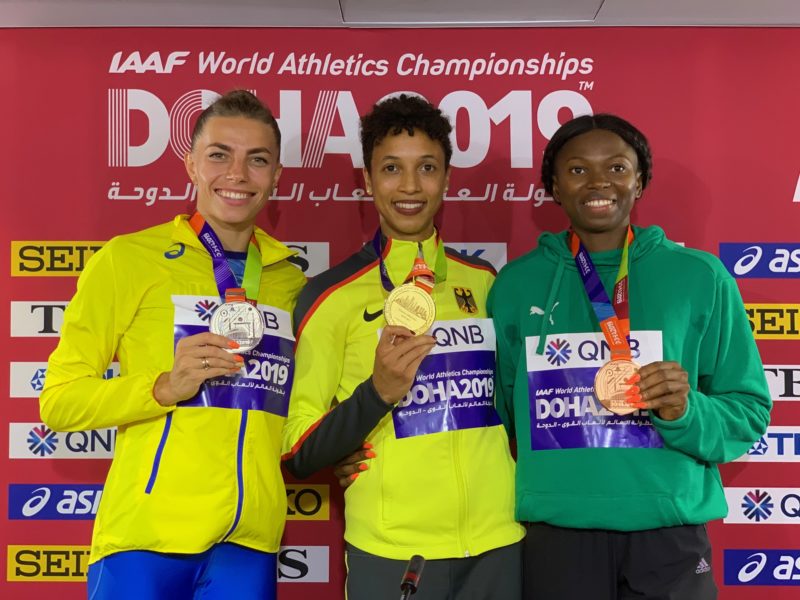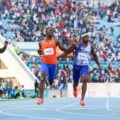Uganda’s Joshua Cheptegei won what is regarded as the toughest race on the planet at the World Cross Country in Denmark in March, and needed to draw on the same resources to win his first world 10,000m title in Doha on Sunday.
This race was Cheptegei’s focus from the moment he claimed that triumph six months ago. In the press conference that followed he laid out his intentions: “My ambition is to dominate the track for the next five or six years.’’
We can’t say we weren’t told. But Cheptegei had to hang tough again as Ethiopia’s Yomif Kejelcha stepped up to this distance to challenge him right until the home straight.
Cheptegei crossed the finish line in 26:48.36 – the second fastest time in World Championship history – with world indoor mile record-holder Kejelcha second in 26:49.34, in only his second attempt at this distance.
Kenya’s Rhonex Kipruto, the World U20 champion, aged just 19, also earned precious metal, taking bronze with 26:50.32.
With all three men aged 23 or under, the future of distance running is assured.
Kenya’s Timothy Cheruiyot did not wait around for anyone to challenge him for the 1500m title, going directly to the front and surging away from the field from the gun.
They only saw his heels from then on, if that. At the bell he had a 25m lead and try as they might, the high-class field could not get near him on the final lap. Cheruiyot stretched away to win by more than two seconds in 3:29.26.
Silver went to Algeria’s London 2012 champion Taoufik Makhloufi in 3:31.38 and bronze to European indoor champion Marcin Lewandowski in a Polish record of 3:31.46.
With some notable exceptions – Christian Taylor, Shelly-Ann Fraser-Pryce, Conseslus Kipruto – these championships have seen the launch of a new wave in the sport.

Ese Brume of Nigeria shows off her bronze medal with other medallists after the press conference for Women’s Long Jump final in Doha / Photo copyright: Yomi Omogbeja
Germany’s Malaika Mihambo is certainly part of that after making the biggest leap for three years to win the long jump with 7.30m.
Her victory was not without suspense after Mihambo followed a mediocre first attempt with a foul that left her teetering on the edge of elimination as she prepared for her third round jump.
By the time she sprinted down the runway and launched into the sandpit, she had won the competition. Any of her last three legal jumps (7.30m, 7.09m, 7.16m) would have secured the title.
Ukraine’s Maryna Bekh-Romanchuk claimed the silver medal (6.92m) and Nigeria’s Ese Brume (6.91m) took the bronze.
There was also drama in the final throwing event of the competition, the men’s javelin, where Grenada’s US college champion Anderson Peters, 21, sprung an upset to win his first world title, hurling the spear 86.89m in the fourth round.
His closest challenger Magnus Girt of Estonia (86.21m) was unable to complete the competition after falling awkwardly and injuring his throwing arm after his fifth attempt, but still took the silver (86.21m) from Germany’s Johannes Vetter (85.37m).
The other upset result came in the 100m hurdles, where American Nia Ali had the race of her life to defeat world record-holder and teammate Kendra Harrison and Diamond League winner Danielle Williams of Jamaica.
Ali, the dual world indoor champion, soared into the all-time top ten list at No. 9, clocking 12.34, to win a hotly-contested final from Harrison (12.46) and Williams (12.47).
It was one of three victories for the US team on the final night as they dominated both 4 X 400m relays.
The US team topped the medal table with 14 golds and 29 medals in total. Kenya finished second (five gold, 11 medals in total) and Jamaica was third (three golds, 11 medals).
Meet The Authors
World Athletics (formerly the International Association of Athletics Federations - IAAF) is the international governing body for the sport of athletics, such as running, jumping and throwing.








